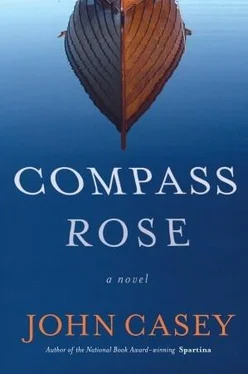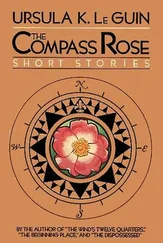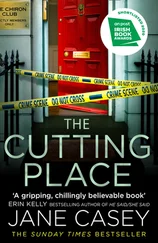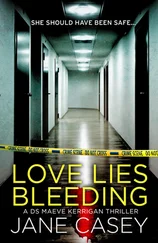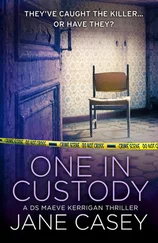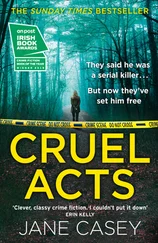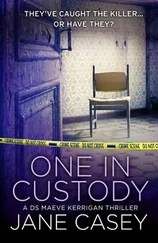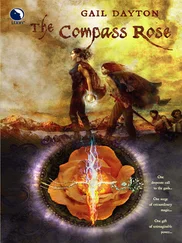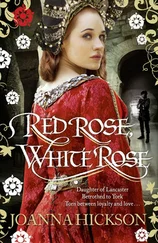Mr. Salviatti came out to meet them. Standing at the top of the steps, he opened his arms. “Mrs. Fitzgerald, Mrs. Pierce — welcome.” He came down and shook their hands. “If you don’t mind, we’ll go right to the garden. Then we can have a cup of coffee and get warm. Good — you’ve got the right kind of boots. All this snow. But it gives a different look to the angels.”
May thought his garden was beautiful. It was big — the size of a football field. Walled in. There were apple and pear trees in squares, their black limbs dusted with snow. Along the paths there was green — rhododendron, arborvitae, and dwarf juniper. There were things that looked like haystacks along the north wall. Mr. Salviatti came up beside her. “My fig trees. They would die in this weather, so we cut them back and make overcoats for them. Out of straw.”
Phoebe had gone straight to one of the angels. She gave a little cry. “Oh, I’m so glad it snowed! They’re so gorgeous in the snow.”
Mr. Salviatti went to her. May followed in his footprints. She found the angel a little frightening. She had to look up to it even though it was kneeling on one knee. It? She? There was a sort of gown, but the chin, nose, and cheeks were large and definite. The outstretched hand was broad and had knuckles like a man’s. The wings had bits of snow caught in the carved feathers, which made them look more like scales. The two angels in the corner of the garden were smaller and much sadder. They faced each other, heads bowed, their hands — smaller and prettier — pressed together in prayer. May felt she was being asked to believe in something Catholic.
Phoebe examined the smaller angels — walked around them, touched the hands. She said something, and her breath drifted past the mouth of an angel so that it appeared for an instant that the angel had breathed. There was something wrong, May thought, in making real-life pictures of things that were meant to be invisible. It was as if horror movies and religion got mixed up.
She was glad Phoebe was finding plenty to say. She didn’t know what she herself would talk about when they went in. Mr. Salviatti walked back to her. “Mrs. Pierce, you may not remember, but we met once, a long time ago.”
“Yes.”
“I miss your husband at the boatyard. I’m glad he’s doing well for himself, of course, but the boatyard isn’t the same.” Mr. Salviatti rubbed his hands together. “And the angels — are they in the right place? Or should we put them in the middle?”
“Oh, not in the middle. I like your garden. It’s like Miss Perry’s but bigger. And more out in the open. I can imagine what that north wall looks like when the fig trees leaf out. But to tell the truth, that big angel is sort of frightening. Maybe that’s just me — I wouldn’t want to think about death when I’m gardening.”
“Ah. Of course. You’re right — the statues were meant to be in a cemetery. But the hand — the way the hand is reaching out — what is it saying?”
May thought she’d already said too much. She looked at Mr. Salviatti. He lifted his arm so it was doing the same thing as the angel’s. She said, “I guess it’s saying that it’s time. It’s all over.”
“Ah. Yes. That would be if the hand is lifted over a living person. But I think of it as over a grave, and it means rest. Don’t be frightened, just rest.” He smiled. “Not so bad, then. Am I changing your mind at all?”
“Maybe. Maybe a little.”
“I’ll tell you another thing. It’s technically more difficult to make a statue with the arms away from the body like that. So when I look at it I think of the man working on it. When you saw the exhibit you saw the name of who made it.” May thought she should tell him Phoebe had — what? — been confused. But Mr. Salviatti went on. “Ugo Serra. But it didn’t say that’s my uncle. My mother’s brother. When I was a boy, I saw him work. So I like it when someone like you sees it fresh. And I like it that you think it’s frightening. Don’t let me talk you out of it.”
Phoebe joined them, and Mr. Salviatti asked them to come inside and get warm.
The view from the main room was wide and long. When she was down in the harbor and looked out to sea, Block Island was on the horizon — from up here it was well this side of it. There was the sound, then the island, and then a good stretch of ocean before it glimmered into the gray sky. Closer in, she saw the tip of Sawtooth Point, the roof of the Wedding Cake. Still closer but to the east there was the end of Rocky Bound Pond and then the tall trees that hid Miss Perry’s house. And then the rise where Elsie Buttrick had her house. May felt a satisfaction — this was the view she wished for, the map she’d used to comfort herself. The houses and the people were hedged in by trees that in their slow growth outdid whatever else went on, absorbed the breaths of all the creatures who ran around wanting one thing and another.
The same maid who’d taken their coats brought in a tray with two coffee pots and crinkly pastries. May wondered where Mrs. Salviatti was.
“Come have some coffee,” Mr. Salviatti said to May. He pointed to the bigger pot. “This is American, the other is Italian.”
Phoebe said, “I love Italian coffee.”
May joined them but picked a seat so she could still look out the plate-glass window. When she sat down, the far wall of the garden cut off the end of the pond, the near wall the first rows of fruit trees. She said, “If your angel is putting out her hand to say rest, it’d be nice if you put her so she’s looking out to sea.”
Phoebe said, “Oh, May,” as if to say, “What’s got into you?”
“Ah. So she’d be telling the sea to be calm,” Mr. Salviatti said. “That’s good. I’ll think about that. My older daughter wants me to move it somewhere else. She knows I’m thinking of having it over my grave, and she says she doesn’t want to think about that every day. My younger daughter, she’s not around enough to have an opinion.”
“Is she at college?” Phoebe said.
“She was. Off and on. You know how that goes — finding herself. You have kids, you love them—” Mr. Salviatti lifted his hand and let it fall. “You love them and then they go away.”
“You have two daughters …,” Phoebe said.
“That’s it — just the two.”
May said, “A pigeon’s clutch.”
Mr. Salviatti laughed. “I’ll bet you got that from Mary Scanlon. That’s an Irish saying. She’s got a million. And songs. Every time I go to Sawtooth, I look in on the kitchen — she’s got three pans on the stove, one in the oven, two other cooks she’s keeping in line, and when she’s not talking over her shoulder at them, she’s singing. One time I went in and she was holding a baby in one arm, stirring soup with the other, always singing. So it’s crazy in there, but good cooks are a little bit crazy, like artists. I told Jack — you know Jack Aldrich — I told him just leave her alone.”
May felt as if she was picked up by a wave. No weight to her, her feet and hands somewhere far away, her body suspended, her eyes open but telling her nothing about up or down.
She didn’t think she said anything, but perhaps she made a sound. Phoebe and Mr. Salviatti looked at her. She put her cup and saucer on the table, pressed her feet to the floor. She decided to go see Elsie and the baby.
Mary Scanlon’s little pickup had four-wheel drive. When Mary went to work, Elsie was left with her old Volvo, which wasn’t any good in snow. She called Miss Perry’s house and talked to Nancy Tran. Everything was fine. Time for a day off. Just Rose and her.
She bundled Rose up and went to the new shed. In the jumble of outdoor toys Sally had dropped off there was a plastic sled — just a bowl, really. She put Rose in it and pulled it to the back of the house. She held on to the rope and lowered the sled to the edge of the pond. She walked onto the ice. Thick enough. She pulled the sled halfway up the slope, set Rose in her lap, and slid down. They picked up some speed as they went over the bank and ended up in the middle of the pond, slowly turning.
Читать дальше
